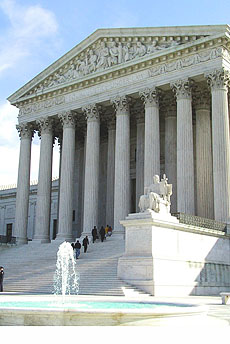 Several years ago Arizona passed a clean elections law that provides state subsidies for candidates who follow certain rules. One provision of the law states that if a subsidized candidate is running against a self-funded candidate, and the self-funded candidate spends more than the subsidized candidate, then the subsidies increase. This is meant to prevent zillionaires from massively outspending everyone else, and needless to say, zillionaires and their allies don’t like this much. Over at SCOTUSblog, Lyle Denniston summarizes the zillionaire side of the argument like this:
Several years ago Arizona passed a clean elections law that provides state subsidies for candidates who follow certain rules. One provision of the law states that if a subsidized candidate is running against a self-funded candidate, and the self-funded candidate spends more than the subsidized candidate, then the subsidies increase. This is meant to prevent zillionaires from massively outspending everyone else, and needless to say, zillionaires and their allies don’t like this much. Over at SCOTUSblog, Lyle Denniston summarizes the zillionaire side of the argument like this:
The only ways a self-financed candidate could prevent the state from helping to put out the message of the subsidized candidate — a “windfall” — would be to reduce the volume of his or her own speech, or at least to rearrange the timing of the speech, with negative effect. Either of those restraints, the petitions argued, would impose the campaigning burden that the Supreme Court had found unconstitutional in the Davis case.
The Davis case is Davis v. Federal Election Commission, in which Samuel Alito ruled against the “Millionaire’s Amendment” of the 2002 campaign finance law. That amendment created different rules for candidates who abided by spending limits vs. those who didn’t, and Alito ruled that Congress had no right to do that. Paul Waldman disagrees:
What is the “right” at issue here? It’s not the right to free speech, since the self-financed candidate still can speak as much as he likes. It’s the “right” to have the loudest voice if you have the most money, to drown out every other voice.
Which isn’t a right at all. It’s a privilege: the privilege of those with money to bend the political system to their will, to have the biggest megaphone, to make sure that their money gives them the ability to put a thumb on the electoral scale.
So how is the Court going to rule? If the Roberts Court has a guiding principle, it’s that those with power should prevail. But as in all cases like this, the decision will likely come down to one man, Justice Anthony Kennedy. No one doubts that John Roberts, Samuel Alito, Antonin Scalia, and Clarence Thomas will rule in favor of the candidates who want to gut the public-financing system so that those with the most money will always have the advantage. The four liberals on the Court will probably disagree. And Kennedy will decide, most likely in favor of the plaintiffs.
The Arizona law is now before the Supreme Court (in McComish v. Bennett), which heard oral arguments today. My guess is that Paul is right: the court will strike down the Arizona law, and this in turn will be the death knell for campaign finance reform. The Arizona law, and others like it, were very carefully crafted to remain within constitutional limits, and if a key provision is struck down it’s difficult to envision any kind of effective limits on campaign financing that the court would uphold. It’s taken them several decades, but combined with last year’s ruling in Citizens United the zillionaires are on the brink of an almost complete victory. Not only does money talk, but soon it won’t have to worry about anyone talking back either.















